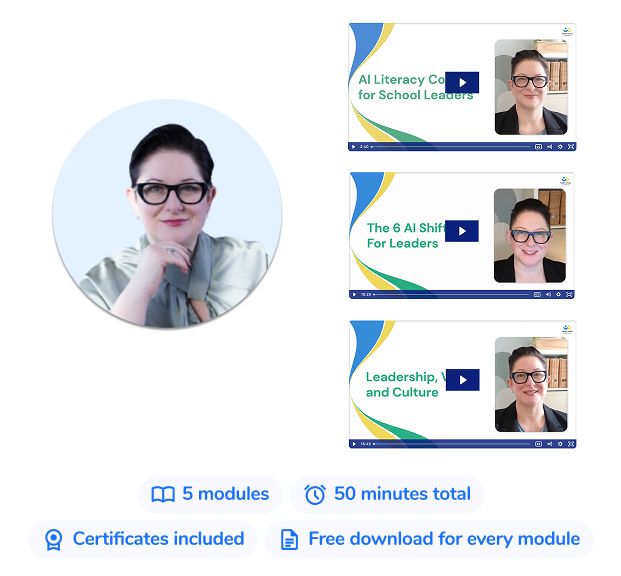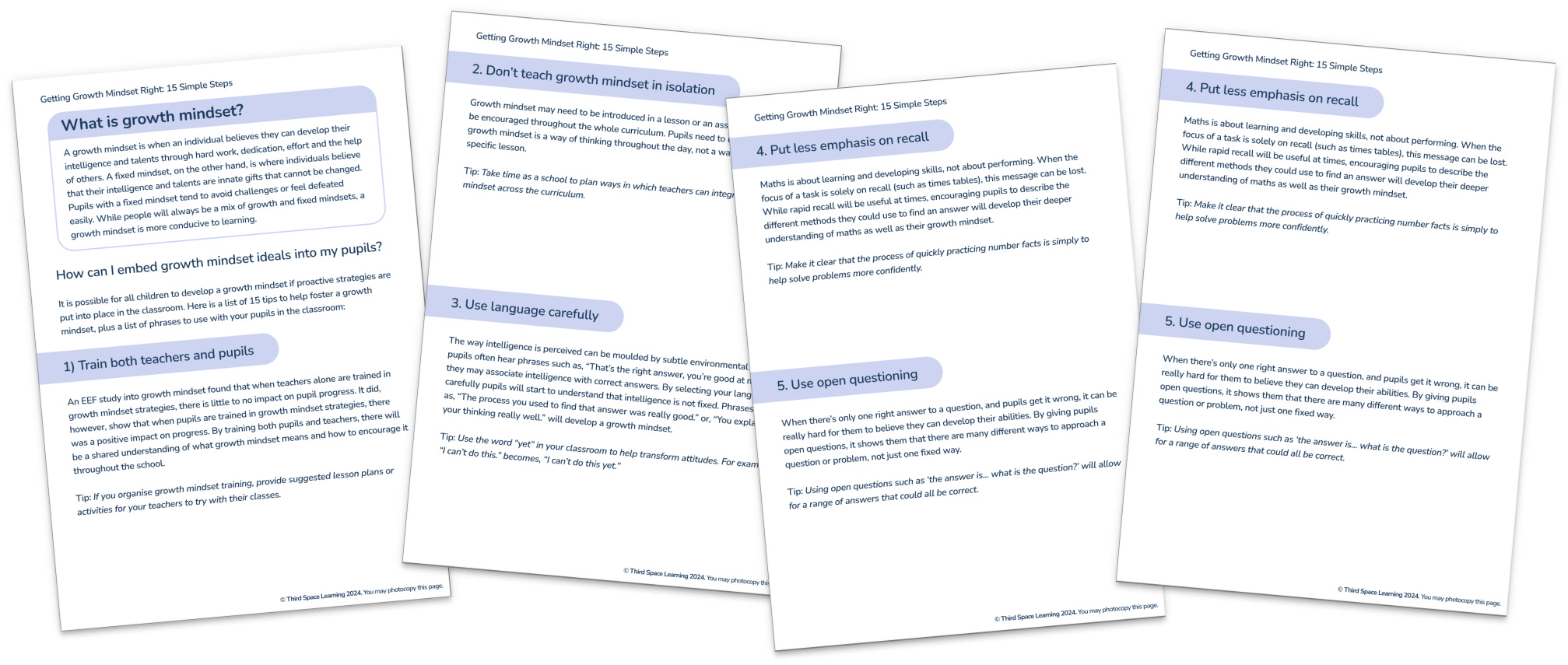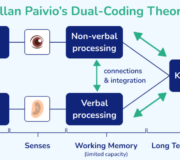Why A Culture of Growth Mindset in Primary School Is Still Important
Unfortunately, many people’s experience of growth mindset in primary school is a growth mindset poster exhorting pupils to ‘try hard’ and ‘learn from your mistakes’. While these are worthy exhortations, there’s more to Carol Dweck’s mindsets research than some primary school displays would have you think.
This article explorea the key principles drawn from Carol Dweck’s theory of fixed and growth mindset and suggests practical ways to integrate a growth mindset in your classroom and across your school alongside other teaching strategies. We’ll also consider common misconceptions within the approach, so you can get it right first time.
For a quick overview of the 15 most effective growth mindset tips and strategies you can use the classroom today download our free guide to Getting Growth Mindset Right (tips, poster and list of recommended growth mindset resources included).
What is growth mindset?
Put simply, a growth mindset is a frame of mind where an individual believes they can develop their intelligence. A growth mindset is built on the principles of perseverance, resilience and learning from failure.
What is a fixed mindset?
A fixed mindset is when a person believes their intelligence and characteristics cannot be changed in any meaningful way.
Get Growth Mindset Right: 15 Simple Steps for Primary Teachers & Leaders
Includes growth mindset poster for the classroom and our top recommended growth mindset reading list
Download Free Now!What does a fixed and growth mindset look like in the classroom?
In maths, a fixed mindset might look like this: “I’m no good at maths. It’s not something I’ll ever be good at”.
Pupils with a fixed mindset tend to avoid taking on challenges in favour of completing easier tasks to look clever or avoid failure. It’s safer to get something easy correct than stumble with a tricker question. We can all think of pupils we’ve taught who are like this.
On the other hand, a pupil with a growth mindset approach knows that through dedication and effort, these qualities can change and they can develop their intelligence and abilities. They believe they can become better mathematicians.
Want to find out more? Watch this video:
How to develop a growth mindset in your classroom
Like all things in teaching, through hard work, careful language and practice, it is possible to adjust how pupils think about the learning process so they’re not trapped by a fixed mindset.
By carefully selecting the activities we plan into our lessons and modelling it with our own behaviour, we can direct the young people we teach to move towards a growth mindset.
Developing growth mindset: long term implications
Of course, you might be asking what the long term benefits of this really are! Research from Dweck’s findings suggest that if you have a growth mindset, you’re more likely to continue working hard, even when you meet obstacles or failures. You persevere, adapt, and try different strategies and you learn.
Instilling this mindset in the children we teach gives them the skills and outlook to support their learning and develop new skills throughout their education and adult life.
With this in mind, we’ve complied a list of the best ways to develop a growth mindset in the primary classroom.
These insights are taken from the successes – and mistakes – we’ve made along the way as maths intervention experts. In short, we’ve made the mistakes, so you don’t have to!
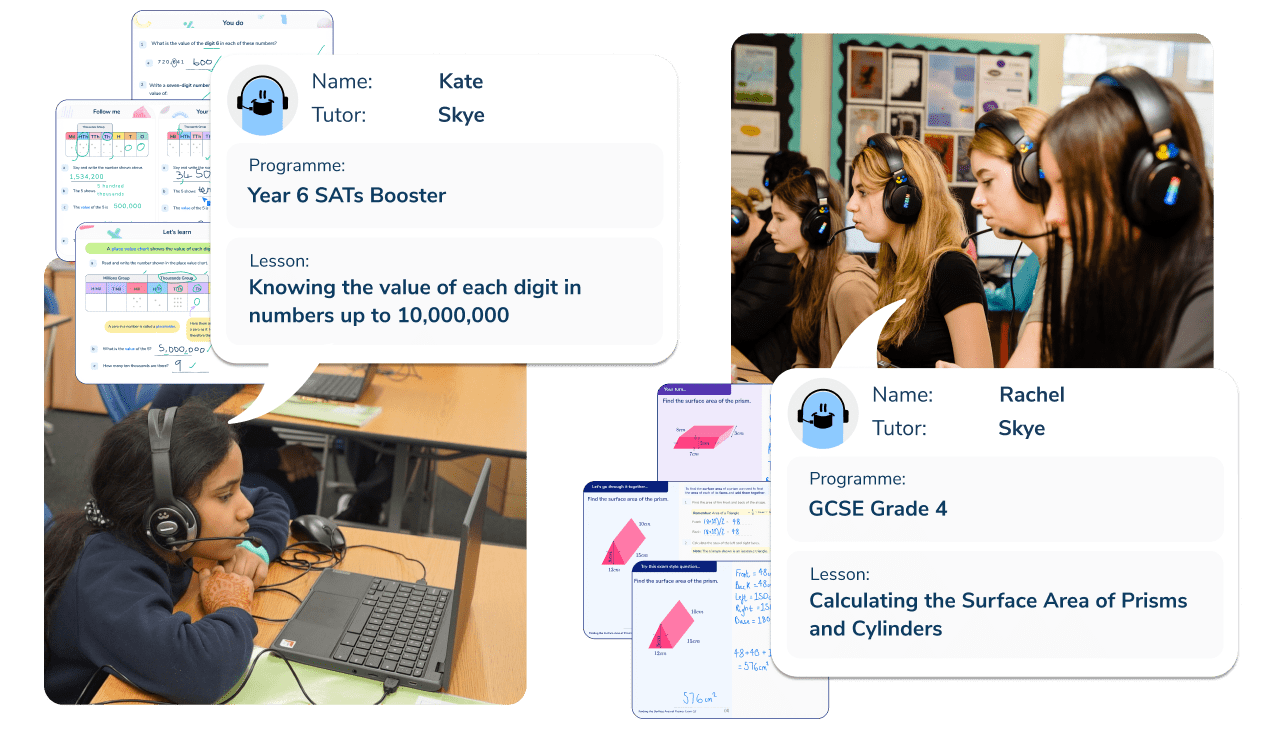
Meet Skye, the voice-based AI tutor making maths success possible for every student.
Built by teachers and maths experts, Skye uses the same pedagogy, curriculum and lesson structure as our traditional tutoring.
But, with more flexibility and a lower cost, schools can scale online maths tutoring to support every student who needs it.
Watch Skye in action15 ways to develop growth mindset attitudes in primary pupils
1. Training teachers alone is not enough
In May 2013, an EEF study found that educating teachers about growth mindset in professional development sessions had “little impact” on pupils’ progress.
However, when pupils were taught about growth mindset directly in class or growth mindset interventions, they made an average of two additional months progress in English and maths.
Teacher tip: If you organise growth mindset professional development, also provide a series of suggested lesson plans for your teachers and pupils to work through.
2. Don’t teach growth mindset in isolation
Often, pupils learn about growth mindset in PSHE or assemblies. This is fine so long as the learning is applied in all subjects areas to help pupils become resilient learners.
That’s what we do at Third Space Learning. Our lesson have been designed to incorporate growth mindset directly into the support slides and Skye, the AI maths tutor has been trained to use it. Prompts encourage pupils to apply it as often as possible.
Teacher tip: TAs a whole school, plan how to integrate growth mindset across the curriculum.
3. Use growth mindset language
Dr Dweck found that people’s idea of intelligence is moulded by subtle environmental cues. This includes the words that we use to praise our pupils.
Some phrases reinforce a fixed mindset: “That’s correct, you’re so good at maths”. Others lead towards a growth outlook: “you worked really hard to find the answer”.
Teacher tip: Share a list of key phrases to develop growth mindset with your staff. There are lots to be found online or you can download a list of free growth mindset phrases here
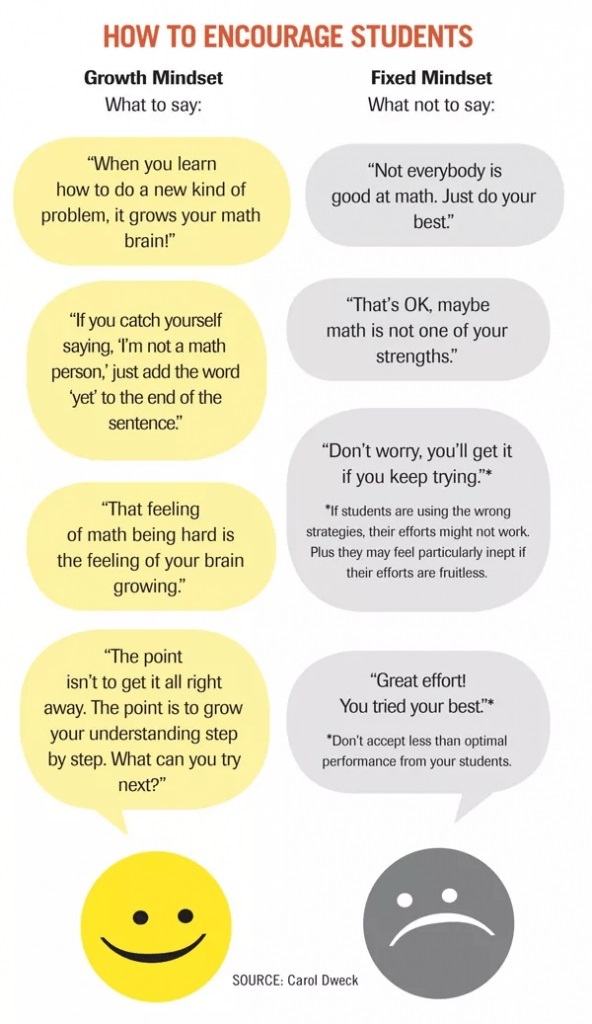
A great place to start is simply using the word “yet” in your classroom to help transform attitudes. For example:
- “I can’t do this” becomes, “I can’t do this yet”
- “I don’t understand” is suddenly, “I don’t understand yet”
This tells your pupils that there’s always room for them to learn and improve.
4. Maths is about learning, not performing
One of Jo Boaler’s top tips to encourage a growth mindset in maths is to emphasise how the subject is about learning and not performing. This message can be confusing when we focus on quick recall of number facts e.g. times tables.
That’s why, during 1-to-1 interventions, pupils receive ‘effort points’ when they show their working. This encourages pupils to think about the learning process rather than solution.
Teacher tip: Adjust the language you use when approaching maths problems with your class. Encourage pupils to take their time in solving a problem (within reasonable limits) and consider how they get to an answer.
Remember, how quickly they can solve a problem isn’t always the be-all and end-all!
5. Use questioning to support a growth mindset
To build numerical fluency, we might focus on recall of number bonds and times tables or procedural fluency with written calculations. When there’s only one right answer to a question, it can be really hard for struggling pupils to believe they can change their abilities.
Teacher tip: To avoid this, integrate and develop as much reasoning and problem solving into your lessons as possible. This gives pupils the chance to work towards solving a problem, even if they don’t initially get the answer right. It also helps to develop pupils’ metacognitive skills.
Additionally, try to use open questions where possible, giving pupils the chance to explain their answers in a way which makes sense for them. This has the added benefit of helping pupils see there are different ways to find answers.
6. Highlight the value of feedback
Individuals with a growth mindset tend to like feedback because they can use it to improve. However, fixed mindset pupils may see feedback as purely negative if they associate it with something they’ve answered incorrectly.
As educators, we know the importance of feedback but we might not always explicitly talk about its benefits, or use it often enough in a clearly constructive manner.
At Third Space Learning, Skye is trained to provide students with positively worded, growth-focused constructive feedback.
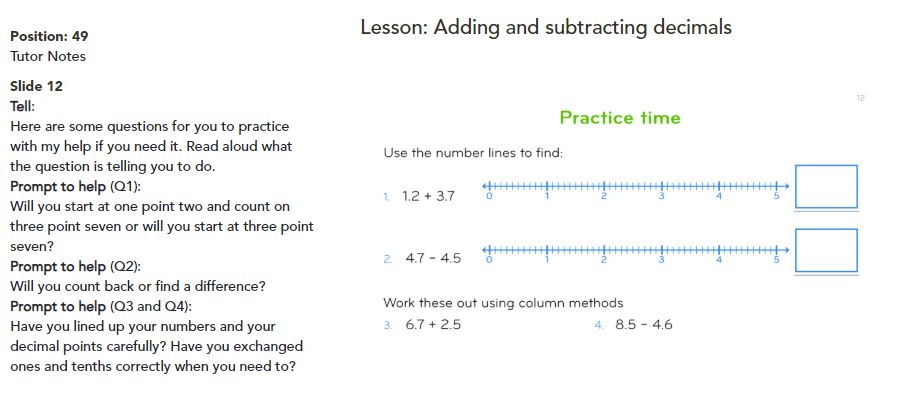
Teacher tip: Give pupils a few moments each week to think about the feedback they have received and how it has helped them improve. Then ask one or two to explain their example to the rest of the class.
For pupils with a fixed mindset, this modelling will encourage them to see that feedback can be an informative and useful tool.
7. Embrace challenges and teach children to love them!
For pupils with a fixed mindset, challenge is scary. Why risk failing and being embarrassed by stumbling on a hard question?
With this in mind, it’s important that harder tasks (or challenges and extension activities) are framed in a positive light. Pupils should be aware that it’s not just about getting it correct, but giving it a go.
Teacher tip: Speak about challenging tasks with enthusiasm and excitement. Take note of the language you use to set the activity. Rather than saying “this task is really difficult”, you could say “there are lots of chances for you to try out different strategies with this question and do lots of learning”.
Some schools find that giving pupils the freedom to choose the level of challenge in their work has a positive impact.
8. Making mistakes is valuable
One of the most powerful messages we can take from the growth mindset theory is that mistakes are an opportunity. Encourage pupils to identify where they went wrong, learn from it and improve for next time.
Teacher tip: Create a “mistake friendly” classroom. This lets pupils know it’s absolutely okay to get stuck and then improve.
Spend some time looking at famous scientists or mathematicians and the way in which they have failed. As Jo Boaler suggests, when pupils get something wrong, you could say “you’re brain just grew, synapses are firing! That’s really good!”.
Integrate a few minutes for reviewing mistakes into all your lessons. You can then reward and praise children who spot a mistake, explain what they got wrong and correct their work. You could even invite them to present it to the rest of the class.
9. Praise the process, not the person
Pupils with a fixed mindset often think that other pupils don’t have to try, they just know the answer. It’s important therefore to emphasise the hard work all pupils are putting in. So always ensure to make the effort visible.
Teacher tip: Reward pupils for trying hard and for persevering when they are struggling. Praising effort rather than getting things right minimises the pressure on pupils who feel like they can only volunteer an answer if they’re sure it’s right.
10. But…don’t just tell pupils to try hard!
Carol Dweck has written more recently about the risk of putting too much emphasis on the effort with the result that you ignore key things which contribute to a growth mindset. It’s important that this praise of effort is not divorced from learning or progress. Simply saying “great effort” when a pupil tries but gets things wrong is actually praising ineffective effort.
Clearly, this is not fair if you don’t then work with the pupil to develop strategies to improve.
Teacher tip: Praise the effort but make sure this is always followed up with next steps. Either look over the work and evaluate mistakes or help the pupil to try a different strategy.
11. Plan lessons to support and develop growth mindset
Changes to mindset can’t happen in isolation. Pupils cannot practice a growth mindset if they are:
- Not provided with future learning strategies
- Given inappropriate activities
- Not given feedback they can act on
Third Space Learning’s 1-to-1 interventions guarantee that every pupil is provided with the appropriate maths activities (and rewards) to enable them both to make progress in maths and develop their own growth mindset. This is then built on with regular feedback both during the lesson and afterwards.
Teacher tip: It might be difficult to provide the same level of personalisation we can when you have a class of 20+ pupils, but there are opportunities! Take care to plan lessons with growth mindset in mind and make sure you always consider these four key growth mindset questions in your planning process.
- Does the work provide the opportunity for pupils to learn something new?
- Are pupils likely to enjoy the work and does it encourage them to approach it with a growth mindset?
- How will I give my pupils meaningful feedback?
- What strategies can I model for struggling pupils?
12. Context, culture, environment, and systems matter
Growth mindset is great, but it’s not a magic wand. People’s mindsets are shaped by their environment and the people around them.
Dweck has spoken a lot about changing learning tasks, testing practices and marking systems to reflect this. It can be challenging in the current educational context, but it’s really important that pupils know school is about learning and not testing.
Teacher tip: One thing you could review is your approach to assessment. While there are summative testing commitments we can’t get away from (e.g. SATs), regular summative assessments which simply give pupils’ a level or score don’t really support a growth mindset.
Is there space for you to move to more formative assessments? Or, can you do more analysis of your existing assessment results on pupil progress so that the main takeaway is their next steps rather than their current level or score.
Third Space Learning’s online Maths Hub includes multiple formative diagnostic assessments you can use as a good starting point for moving to a more formative assessment focused classroom.
13. Work with parents
Environment shapes growth mindset. It’s therefore essential that if we want to make any real changes to pupil mindset we involve and educate parents about this.
We all know those parents who sit in parents evening and say, “well, I was rubbish at maths when I was at school”, or “I can’t help them because I don’t know how to do it”.
Teacher tip: Invite parents into school to find out about growth mindset and explain how they can help at home. If they can’t come in, put together a list of top tips for parents and send them home.
Another idea might be to set some homework specifically around growth mindset that pupils and their parents need to work on together. You could even hold a growth mindset assembly or give awards to pupils each week which focuses on growth mindset.
For more on getting parents engaged with their pupils’ maths learning, download our free guide: ‘Maths at Home – 15 Top Tips for Parents and Carers’.
14. Embrace a growth mindset with your staff
Within training, lesson observations and coaching staff also need to be open to change and growth. Just as summative assessment reinforces a fixed mindset for pupils, grading a lesson can suggest to teachers that their teaching is fixed at a certain level.
Clearly, if we are telling pupils that it’s OK to make a mistake, we have to take the same approach with teachers. If teachers are worried about getting things wrong or under huge amounts of pressure, they’re unlikely to want to try any new strategies or make changes to their teaching.
It has to be acceptable for teachers to experiment, and it’s important for SLT to support and cultivate this approach.
Teacher tip: Rather than give a grade, pick out one or two actions which teachers apply to improve their lessons. Or rather than judging whole lessons, set a focus for each week or half term and work with teachers to come up with ways to improve this across the school.
In addition, providing a supportive and effective programme of CPD will go a long way to reinforce growth mindset and creates a culture of lifelong learning in school.
Another thing you can do is to shift the focus in any staff briefings or regular meetings that you have. These have a tendency to be based on upcoming events in the calendar. But really, this information can be shared easily by email or a staff portal. Instead, use the time to focus on CPD.
How about picking a teaching tip that can be explained and quickly practised by all teachers then integrated into teaching that week?
15. Embed a growth mindset culture across your school
These steps are useful, but underpinning it all, is the fact that you need to make your pupils truly embrace and present a positive attitude focused on growth mindset.
You will need to look at how your whole school structure, culture and processes feed into a growth mindset approach. Otherwise, there’s a risk that our own actions may reflect a fixed mindset and pupils will pick up on this.
Teacher tip: Three quick things you can do today to start your school growth mindset journey
- Download and share with staff our free growth mindset top tips and classroom or staffroom poster.
- Deliver staff training on growth mindset.
- Give teachers time to plan growth mindset lessons – you might want to design a lesson plan around the suggested reading in our free growth mindset resource.
Kick start growth mindset culture with a classroom contract
My ace in the hole for kick-starting a culture of perseverance and a growth mindset in KS2 is the class contract. This year I asked my new Year 5 class to sign a contract just like the one below, they loved it!

Collaborative and cooperative process
Using the contract, explain to the children that throughout the year we will take part in activities that would require determination.
Discuss the different forms of determination with clear examples, such as ‘quiet determination’, ‘failing and then trying again’, ‘not giving up on the first, second or third attempt, but persisting until you understand.’
It is worth noting that children do not have to sign the contract. This would defeat the purpose.
Remind children that they ‘don’t have to sign it today’. They should only sign it when they believe what the words say.
One of the children in my class had this experience. He wasn’t sure whether or not to sign so I told him he should sign it only if he believes in the contract.
He thought about the sentiment and – by the end of the afternoon – he said ‘I like this, I want to try my best, so I will sign on the dotted line.’
Nobody ever said that developing a growth mindset would be instant…
DO YOU HAVE STUDENTS WHO NEED MORE SUPPORT IN MATHS?
Skye – our AI maths tutor built by teachers – gives students personalised one-to-one lessons that address learning gaps and build confidence.
Since 2013 we’ve taught over 2 million hours of maths lessons to more than 170,000 students to help them become fluent, able mathematicians.
Explore our AI maths tutoring or find out about maths tuition for your school.
